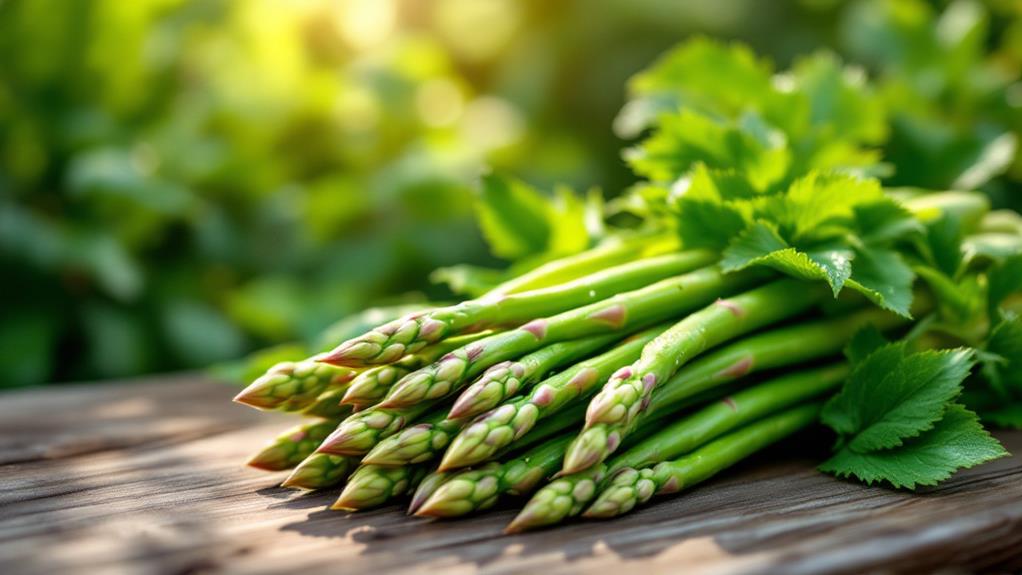Types and Health Benefits of Corn: A Nutrient-Rich Grain
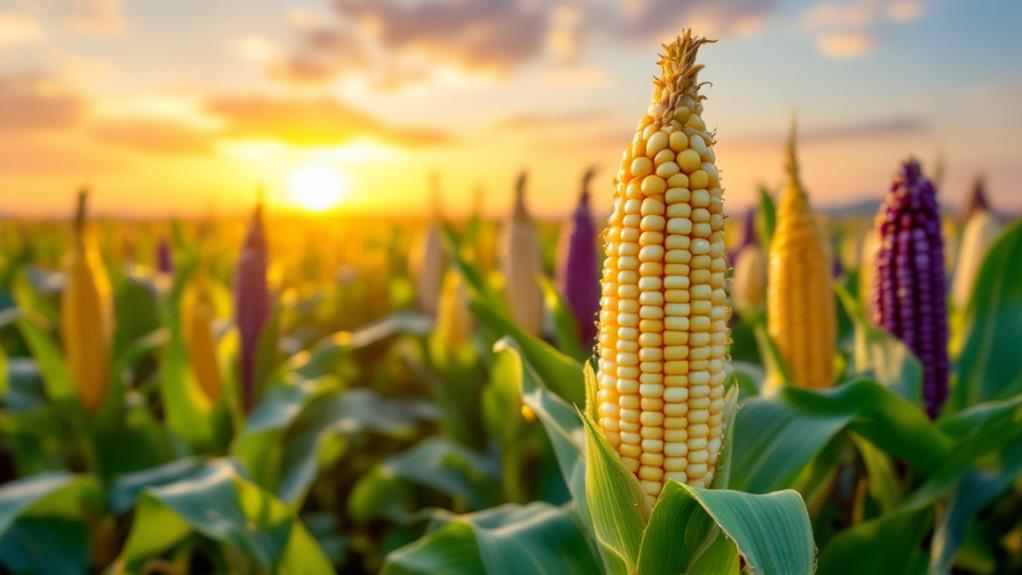
Corn, a versatile and nutrient-rich grain, comes in varieties like sweet corn, flint corn, popcorn, and dent corn, each with unique uses. It's packed with vital vitamins such as vitamin C and B6, along with minerals like potassium and magnesium. Corn supports digestion with dietary fiber and promotes eye health through antioxidants like lutein and zeaxanthin. Whole grains like corn can reduce the risk of certain diseases and maintain energy levels. While enjoying corn, be mindful of factors like blood sugar impact and potential allergens. There's a lot more to uncover about its benefits and uses.
Types of Corn
When exploring the varied world of corn, you'll find several distinct types, each with unique characteristics and applications. Sweet corn stands out for its mild sweetness, making it a favorite for fresh consumption or grilling. Available in yellow, white, or mixed options, sweet corn is perfect for summertime meals. Flint corn, with its hard kernels, is primarily used to make cornmeal. You'll often see it in decorative displays, especially during the fall in the U.S.
Popcorn, a special type of flint corn, is famous for its ability to explode into a fluffy snack when heated. It's a staple at movie theaters and a fun treat at home. Dent corn, recognizable by the distinctive dent in its kernels, is mainly grown for animal feed and processed foods. Its flexibility makes it an essential component in multiple industrial applications.
With over 200 options cultivated in the U.S., corn demonstrates incredible flexibility, serving as a nutrient-rich staple with numerous health benefits. Each type of corn offers something unique, regardless of it being for consumption, decoration, or industrial use, highlighting corn's significant role in both culinary and cultural contexts.
Nutritional Profile
Corn's nutritional profile is rich and diverse, offering numerous health benefits. When you consume corn, you're getting a well-rounded mix of nutrients that your body needs. Each kernel of corn is packed with fundamental vitamins like vitamin C, B6, and folate, which play significant roles in maintaining your complete health. Corn kernels are also a good source of notable minerals such as potassium and magnesium, both of which are vital for your body's proper functioning.
You'll find that corn is particularly rich in carbohydrates, with boiled yellow corn offering about 21 grams of carbohydrates per 100 grams, primarily in the form of starch. Despite its carbohydrate content, sweet corn remains low on the glycemic index, making it a smart choice if you're watching your blood sugar levels. Moreover, corn provides around 3.4 grams of protein per 100 grams, contributing to your daily protein intake.
Fiber is another key component, especially when you enjoy popcorn, which can have a fiber content ranging from 9-15% of its dry weight. Plus, corn is loaded with antioxidants like lutein and zeaxanthin, which support eye health. In summary, corn offers a nutrient-dense option for a balanced diet.
Health Benefits
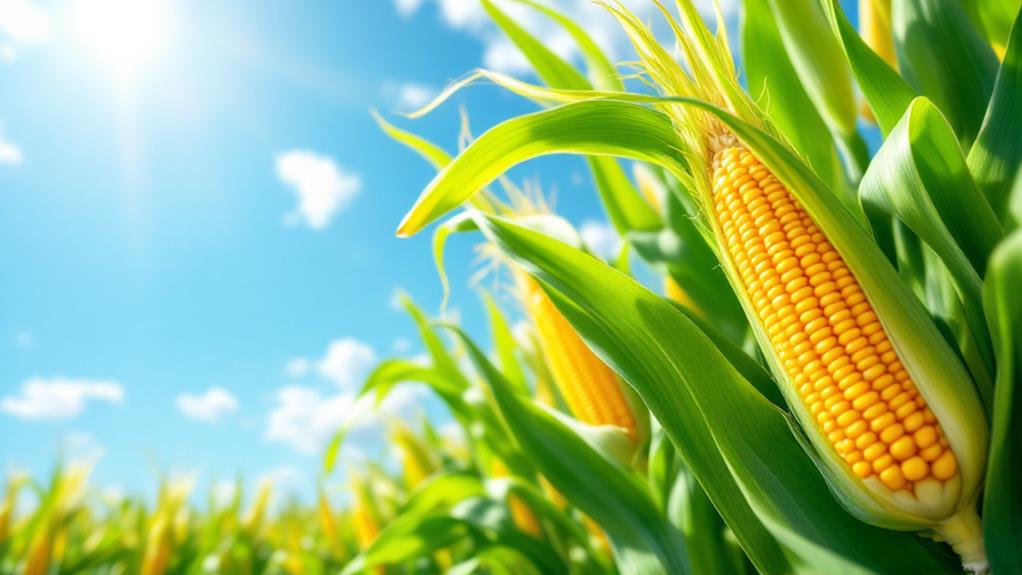
Corn offers a variety of health benefits that make it a valuable supplement to your diet. Rich in dietary fiber, corn supports digestion and promotes regular bowel movements. Just a 100-gram serving provides about 2.4 grams of fiber, helping you maintain a healthy digestive system. The antioxidants lutein and zeaxanthin in corn are important for eye health, potentially reducing the risk of macular degeneration and cataracts. By incorporating corn into your meals, you're not only supporting your vision but also protecting your eyes from aging-related issues.
Consuming whole-grain corn, such as popcorn, contributes to a lower risk of diverticular disease, particularly in men, enhancing digestive health further. Corn is packed with significant vitamins and minerals, including potassium and B vitamins, which are crucial for regulating blood pressure and maintaining energy levels. These nutrients play a prominent role in supporting your general well-being.
Additionally, the presence of quercetin in corn may help reduce inflammation, lowering the risk of chronic conditions like Alzheimer's disease and prostatitis. By adding corn to your diet, you can enjoy these numerous health benefits, making it a nutritious and tasty choice.
Risks and Considerations
Have you ever considered the potential downsides of adding corn to your diet? While corn contains fundamental nutrients, it also has antinutrients like phytic acid. This compound can impair the absorption of minerals like iron and zinc, especially if you consume large quantities without proper preparation such as soaking or cooking. Furthermore, corn is susceptible to mycotoxin contamination from fungi, posing health risks that can affect your immune system and even increase cancer risk. Thus, it's vital to guarantee that corn is sourced from reliable, well-regulated suppliers.
For individuals with gluten intolerance, such as those with celiac disease or IBS, corn may cause digestive issues like bloating and discomfort. You should be cautious and monitor any adverse reactions. In addition, corn's high sugar and carbohydrate content can impact blood sugar levels. If you have diabetes, it's important to monitor your intake and adjust portion sizes accordingly.
There's also the consideration of genetically modified (GM) corn. Although no definitive health risks have been proven, being informed about GMOs in your food products can help you make better dietary choices. Always stay aware of what you're consuming to maintain a balanced diet.
Culinary Uses
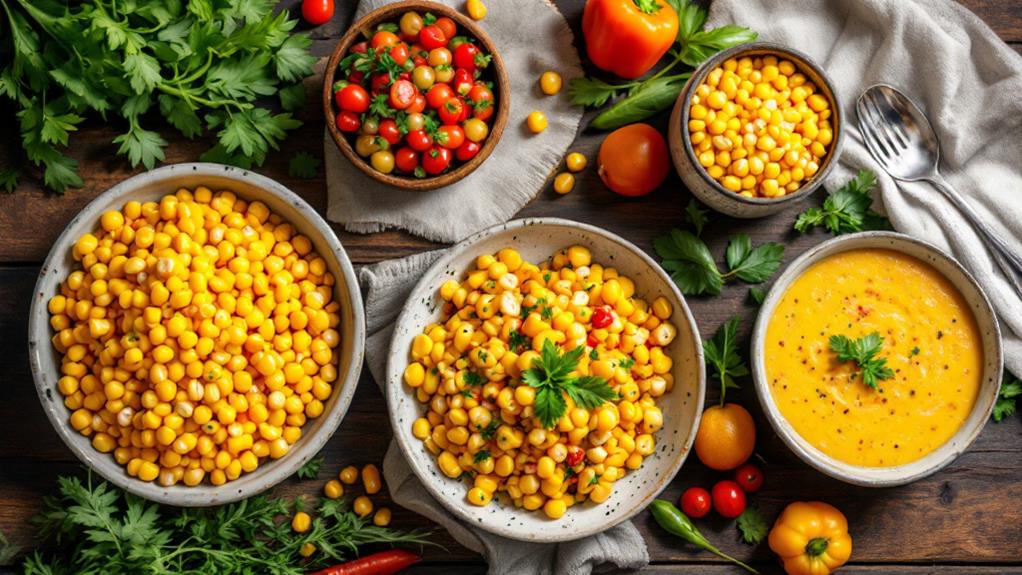
As you weigh the potential risks of incorporating corn into your diet, it's also worth exploring its varied culinary applications that enhance flavor and diversity to meals. Corn is a staple in many kitchens, offering a wide array of culinary products like tortillas and cornmeal. These ingredients serve as the foundation for dishes such as tacos and cornbread, highlighting corn's versatility across different cuisines.
Fresh corn on the cob, with its natural sweetness, can be enjoyed through multiple cooking methods—boiling, grilling, or roasting—making it a delightful supplement to any meal. If you're fond of Asian cuisine, baby corn is a popular choice for enhancing the texture and flavor of appetizers, soups, and stir-fries.
When seeking a healthy snack, consider popcorn. Air-popped and free from excess fat and sodium, popcorn offers a satisfying crunch as a whole-grain alternative. However, be mindful of processed corn products like corn chips, as they often contain added sugars and unhealthy fats.
- Tortillas and Cornmeal: Versatile bases for many dishes.
- Fresh Corn: Best enjoyed soon after harvest.
- Baby Corn: Adds texture to Asian dishes.
- Popcorn: A healthy, whole-grain snack.
Corn enriches your culinary repertoire with its myriad uses.
Preparation and Storage
In regard to preparing and storing corn, timing is crucial to maintaining its freshness and flavor. Fresh corn should be stored in the refrigerator and consumed within a few days to guarantee maximum freshness. The sweetness and flavor of corn diminish rapidly after harvesting, so prompt use is key. If you'd like to enjoy corn long after its peak season, you can freeze it. Begin by removing the husks, then boil the ears for four minutes. Immediately blanch them in ice water for another four minutes. Afterward, slice the kernels off the cob and package them in freezer-safe bags or containers for storage.
For those interested in cooking methods, corn is versatile. You can enjoy it by roasting, boiling, grilling, or microwaving. Microwaving is the quickest method, taking about two minutes per ear. Roasting corn can improve its natural sweetness and add a delightful smoky flavor.
While canned corn offers a convenient long-term storage option, fresh corn provides the most health benefits. To optimize nutrients, consume corn in its unprocessed kernel form shortly after harvest. Proper preparation and storage guarantee you enjoy corn's delicious taste and nutritional advantages year-round.
Cultural Significance
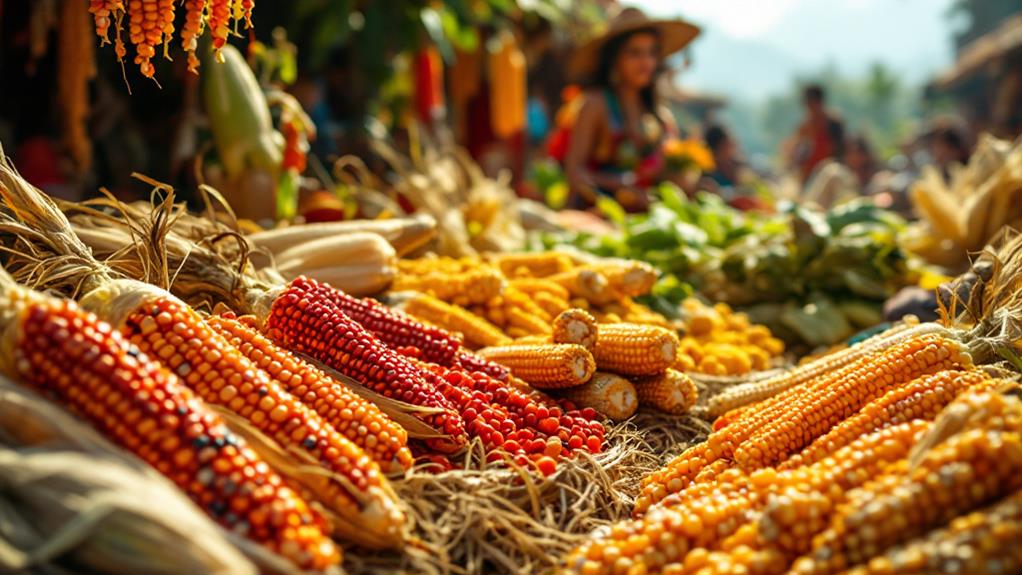
Corn, often referred to as maize, is much more than just a staple crop; it's deeply woven into the cultural fabric of societies across the Americas and beyond. Domesticated around 10,000 years ago, maize holds profound cultural significance, symbolizing life in ancestral rituals and festivals. For ancient Mexican civilizations, corn was sacred, integral to their agriculture and spirituality. It represented sustenance and was central to numerous ceremonies.
The cultural impact of corn extends beyond rituals. It played a crucial role in the initial Thanksgiving meal in the U.S., underscoring its historical and culinary significance. You can't think of American culture without considering the influence of maize on its culinary traditions.
After its introduction to Europe in the late 15th century, corn quickly became a staple crop, reshaping agriculture and diets across the continent. Its versatility in different dishes helped cement its place in diverse culinary practices.
Here's how corn's cultural significance manifests:
- Ancestral Rituals: Used in ceremonies to symbolize life.
- Spirituality: Considered sacred in ancient civilizations.
- Thanksgiving Tradition: Central to the initial Thanksgiving meal.
- Culinary Versatility: Integral to diets across the Americas and Europe.

